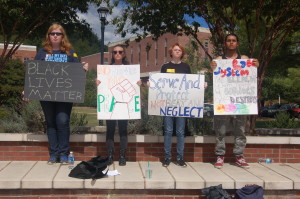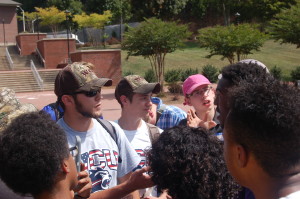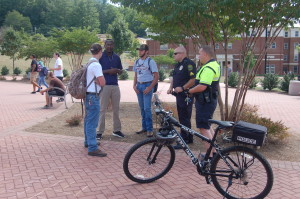
WCU students on silent protest, Sept. 23, 2016. Photo by Ashley Kairis.
People stood tall with signs reading, “Hands up, don’t shoot,” “Black Lives Matter,” and “No justice, no peace.”
WCU Students gathered around the fountain Friday, Sept. 23 in a silent protest as a result of the controversy surrounding the recent shooting in downtown Charlotte.
Others crowded together to share in dialogue about the Black Lives Matter movement as well as their takes on the Charlotte shooting, as it hits close to home for many.
Junior, Troy Eckles, came to the fountain to share his own perspective.

Students discuss racial issues during the protest. Photo by Ashley Kairis
“I think as black men, we are automatically deemed dangerous unless we’re dribbling a ball or playing football,” said Eckles in conversation with an interested bystander. “You can contribute to removing that bias that black people are dangerous by something like this; coming out here and standing up for what I just talked about, that’s how you help somebody else who feels like their life is worth nothing. It takes a village.”
While some protesters chose to remain silent with symbolic yellow tape across their mouths, others spoke out. Students took this as an opportunity to break down walls and openly discuss whatever view they held.
“Specifically in regards to the Black Lives Matter movement, the reason why we’re out here today is to protest unlawful killings of black and brown males who are unarmed”, said senior, Manuel Zenquis.

Protesters talk to police who are standing by to make sure the protest remains peaceful. Photo by Ashley Kairis
In a time when speculation spreads like wildfire over social media, this protest created a chance for the conversation to be face-to-face.
Amongst the crowd were several police officers including the WCU Campus Police Chief, Ernie Hudson. As he sat overviewing the crowds.
“It was one of the best put together demonstrations I’ve ever seen on campus. They had a powerful message and they didn’t have to scream it to get their message across,” said Hudson.
He also chimed in on a perspective of his own regarding the police involved shooting.
“No one is happy about police-action shootings and, believe it or not, especially the police. Most police officers who are involved in a police action shooting, their careers are ruined,” said Hudson.
In conversation about the specific case of Charlotte, he commented on what police protocol is under the U.S. Supreme Court’s ruling.
“Doesn’t matter if you agree with it or not, if I’m in fear and a reasonable police officer would think that I’m in fear, then I am authorized to use deadly force.”
Without a doubt, many people are hurt and confused in the aftermath of the Charlotte shooting. It is public events such as this protest and the dialogues on campus that allow not just one or two perspectives, but all to be heard.


